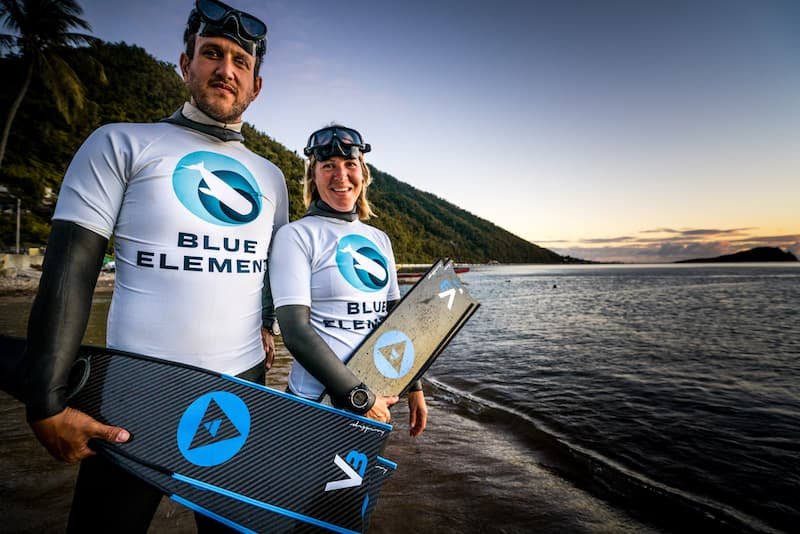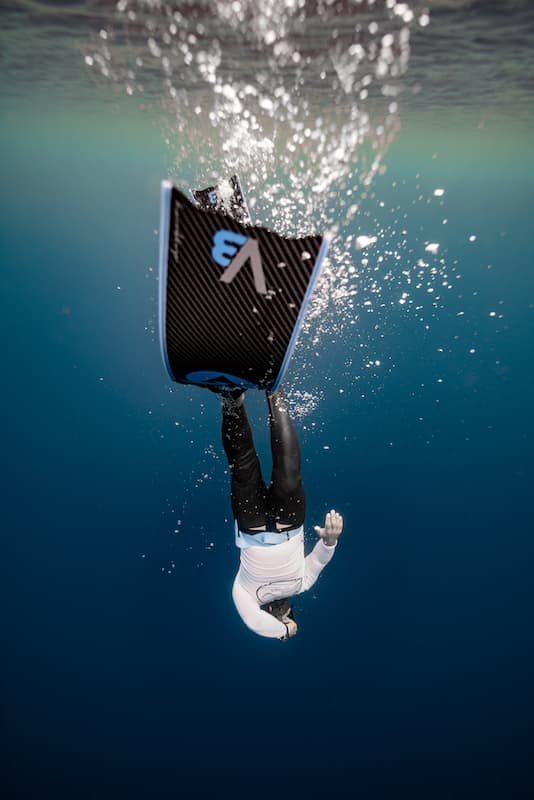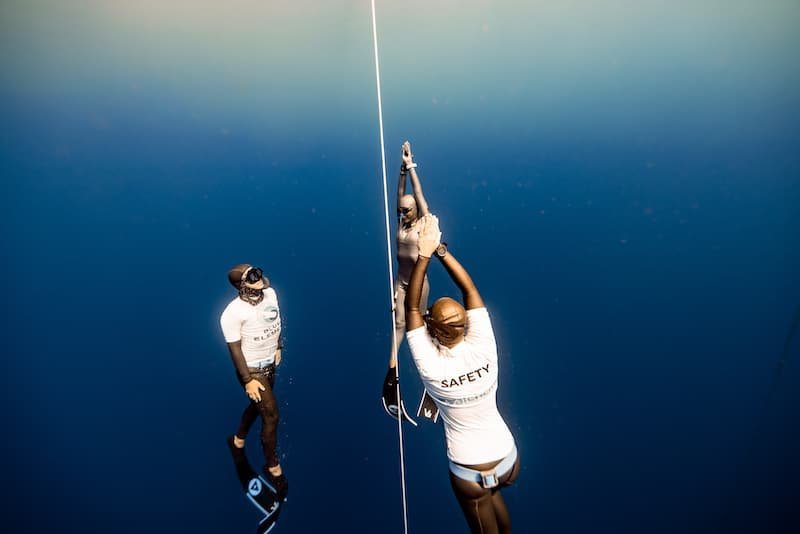
 Nick Pelios
Freediver, Creator
Nick Pelios
Freediver, Creator

 Nick Pelios
Freediver, Creator
Nick Pelios
Freediver, Creator
When embarking on the incredible journey of freediving, a world of underwater wonders and personal achievements awaits. It's an exhilarating sport that demands physical prowess, mental fortitude, and a profound connection to the ocean's mysteries. If you've decided to take the plunge into this world, there are three essential things to keep in mind that will ensure a safe and rewarding experience.
Embarking on the exhilarating journey of freediving begins with a critical and foundational step: selecting the right instructor. It is often said in the world of freediving that "it's not about how deep you go, but how well you connect with the ocean." This profound connection is nurtured and guided by a knowledgeable and experienced mentor who understands the intricate dance between human physiology and the underwater realm.
Before you plunge into the enchanting world of freediving, it's imperative to dedicate time to thorough research. You are presented with the choice between freelance instructors and established freediving schools, each offering its unique advantages. The decision you make at this juncture can significantly impact your freediving journey. Therefore, it's crucial to find an instructor whose ethos and expertise align with your aspirations and objectives.
Whether you are driven to specialize in a particular discipline within freediving, such as dynamic apnea or constant weight, or you simply yearn to explore the mesmerizing depths of the ocean, your choice of instructor plays a pivotal role. A conscientious selection will serve as the bedrock for a successful and fulfilling freediving experience.

An accomplished instructor brings not only technical proficiency but also an innate passion for the sport. Their guidance is more than just imparting knowledge; it's an art of fostering a profound understanding of the sea's mysteries and teaching the delicate balance between the body's capabilities and the challenges of the aquatic world. Such mentors are dedicated to the safety and well-being of their students, ensuring that each dive is a journey of self-discovery and connection with the ocean's wonders.
As you progress on your freediving path, your instructor's insights, wisdom, and encouragement will prove invaluable. They will not only refine your technique but also instill in you a deep respect for the ocean and a profound connection to the underwater world. This connection, nurtured by the right instructor, is what sets freediving apart as a transformative and soul-enriching experience.
In essence, finding the right instructor is the gateway to your freediving adventure. It is a choice that can shape not only your skills but also your perspective on the world beneath the waves. With the right mentor, you'll discover that freediving is not merely a sport; it's a journey of self-discovery, a dance with the ocean's currents, and a lifelong connection to the wonders of the deep.
Much like a mountaineer depends on specialized equipment for scaling treacherous peaks, a freediver must carefully outfit themselves for the challenging depths of the sea. While there's no immediate need to invest in top-of-the-line gear, the choices you make in selecting your freediving equipment can significantly enhance your underwater experiences.
The first consideration in equipping yourself for freediving is the choice of fins. Upgrading from standard plastic fins to lightweight carbon fins can be a game-changer. Carbon fins offer increased propulsion efficiency, enabling you to move through the water with less effort. This enhanced efficiency can lead to longer and more comfortable dives, allowing you to explore the depths with greater ease. The investment in quality fins pays dividends in improved performance and reduced fatigue.
A well-fitted wetsuit is another critical piece of equipment in a freediver's arsenal. Wetsuits serve not only to keep you warm but also to ensure your comfort during extended periods underwater. While custom-made wetsuits are the ideal choice, finding one that suits your body and local diving conditions is equally important. The right wetsuit should offer a snug fit without being overly restrictive, as this balance ensures that your body temperature is maintained and your movements remain unrestricted.

Weights are also vital components of freediving gear, as they play a crucial role in buoyancy and stability underwater. Finding the ideal combination of neck weights and belts is essential for achieving the buoyancy control necessary for freediving. Experimenting with different weight distributions allows you to discover what makes you feel most comfortable and in control during your dives. The right weight configuration not only enhances your safety but also promotes a sense of confidence and mastery in the water.
Ultimately, the significance of choosing the right freediving equipment cannot be overstated. Your gear is not merely a set of tools; it's an extension of yourself as you explore the underwater world. Thoughtful choices in equipment can transform your freediving experiences, making them safer, more enjoyable, and more fulfilling.
As you descend into the depths, your gear becomes your lifeline, offering not only protection from the elements but also the means to extend your capabilities as a freediver. With the right equipment, you'll find that the underwater world becomes more accessible, and your connection to the ocean deepens. In every dive, your choice of gear enhances your performance and ensures that your freediving journey is as enriching as it is safe.
At its core, freediving is a captivating and demanding pursuit that compels individuals to venture into an environment where human beings are not naturally adapted to thrive. As they submerge themselves into the depths of the ocean, freedivers are confronted with a dual challenge that encompasses both physiological and psychological aspects, setting the sport apart as a profoundly unique and introspective experience.
The underwater world, where freedivers choose to immerse themselves, is inherently foreign to our terrestrial existence. It is an environment marked by its darkness, pressure, and silence, with a stark contrast to the conditions to which we are inherently adapted. This dichotomy is where freedivers find themselves, bridging the gap between the world they know and the world beneath the waves. In doing so, they must grapple with the complexities of human physiology, mastering the art of breath-holding and acclimating to underwater pressure changes.
Yet, freediving is not a mere test of physical endurance and capabilities. It is equally a test of mental fortitude and resilience. The psychological barriers that emerge as one descends into the ocean's depths can be as formidable as the physiological challenges. The ocean, with its vastness and seeming endlessness, can evoke a sense of awe and vulnerability, prompting questions about the unknown lurking in its depths.

One of the fundamental aspects of mental training in freediving lies in the art of managing fear and anxiety. The prospect of descending into the ocean's seemingly limitless abyss can be a daunting and anxiety-inducing experience, even for the most seasoned freedivers. It is crucial to understand that fear is a natural response to the perceived risks and uncertainties of the underwater world. The unknown depths, the absence of familiar landmarks, and the silence can all contribute to a sense of trepidation.
However, what distinguishes accomplished freedivers from novices is their ability to confront and manage this fear. Mental training equips divers with an arsenal of techniques to confront their anxieties head-on. These techniques allow freedivers to stay calm, maintain focus, and nurture a sense of confidence that is indispensable for safe and successful dives.
The psychological skills developed through mental training are not limited to managing fear and anxiety alone. They also encompass the ability to achieve a state of meditative focus while submerged, blocking out distractions and immersing oneself fully in the present moment. This level of concentration is crucial not only for conserving precious oxygen but also for extending dive times and maximizing the enjoyment and safety of underwater exploration.
Ultimately, freediving represents a harmonious blend of physical and mental challenges. It is a quest to bridge the gap between the human world and the ocean's enigmatic depths. In this endeavor, freedivers confront not only the limits of their physical capabilities but also the boundaries of their own minds. The profound connection with the underwater world, the mastery of breath, and the conquest of fear collectively contribute to the uniqueness and transformational power of freediving. It is a sport that defies our terrestrial limitations, offering those who venture into its depths a remarkable journey of self-discovery and awe-inspiring encounters with the wonders of the ocean.